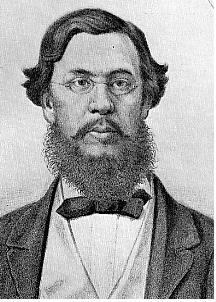The directory «Plots»
Dobrolyubov (Äîáðîëþáîâ) Nikolay Aleksandrovich
(1836–1861)

Nikolay Dobrolyubov was a radical Russian utilitarian critic who rejected traditional and Romantic literature. Dobrolyubov, the son of a priest, was educated at a seminary and a pedagogical institute. Early in his life he rejected traditionalism and found his ideal in progress as represented by Western science. In 1856 Dobrolyubov began contributing to Sovremennik (“The Contemporary”), an influential liberal periodical, and from 1857 until his death he was chief critic for that journal. He was perhaps the most influential critic after Vissarion Belinsky among the radical intelligentsia; his main concern was the criticism of life rather than of literature. He is perhaps best known for his essay “What is Oblomovism” (1859–60). The essay deals with the phenomenon represented by the character Oblomov in Ivan Goncharov's novel of that name. It established the term Oblomovism as a name for the superfluous man of Russian life and literature.
USSR, 1936, Nikolay Dobrolyubov
USSR, 1961, Nikolay Dobrolyubov
USSR, 1961.02.05,  Leningrad. 125th Birth anniv of Dobrolyubov
Leningrad. 125th Birth anniv of Dobrolyubov
USSR, 1961.02.05,  Moskow. 125th Birth anniv of Dobrolyubov
Moskow. 125th Birth anniv of Dobrolyubov
USSR, 1986.02.05,  Gorky. 150th birth anniv of Dobrolybov
Gorky. 150th birth anniv of Dobrolybov
Russia, 2011,  Nikolay Dobrolyubov
Nikolay Dobrolyubov
USSR, 1960,  Nikolay Dobrolyubov
Nikolay Dobrolyubov
USSR, 1985,  Nikolay Dobrolyubov
Nikolay Dobrolyubov
USSR, 1985,  Dobrolyubov's museum in Gorky
Dobrolyubov's museum in Gorky
USSR, 1991,  Dobrolyubov monument in Nizhy Novgorod
Dobrolyubov monument in Nizhy Novgorod
USSR, 1986.12.02,  Dobrolyubov monument in Gorky
Dobrolyubov monument in Gorky
USSR, 1991.10.30,  Dobrolyubov monument in Nizhny Novgorod
Dobrolyubov monument in Nizhny Novgorod